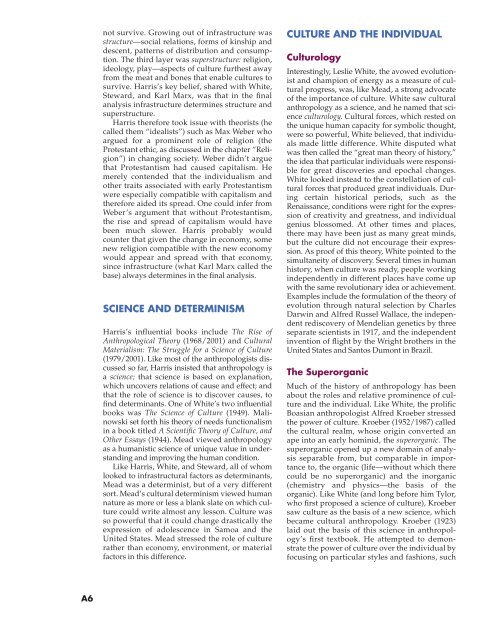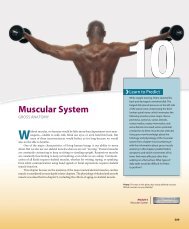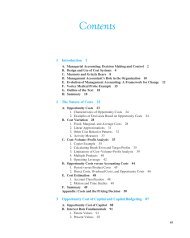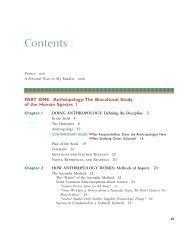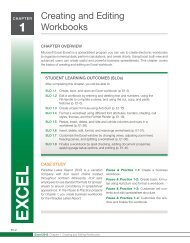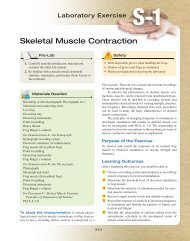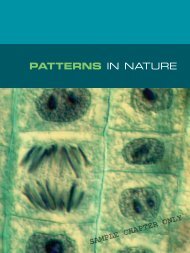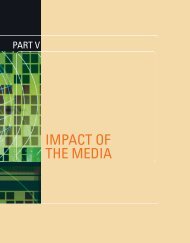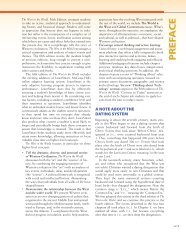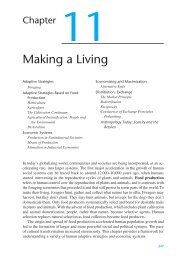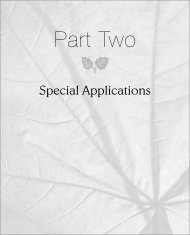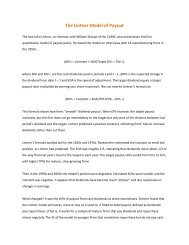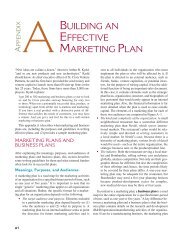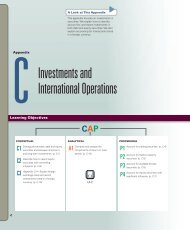Appendix 1 A History of Theories in Anthropology
Appendix 1 A History of Theories in Anthropology
Appendix 1 A History of Theories in Anthropology
You also want an ePaper? Increase the reach of your titles
YUMPU automatically turns print PDFs into web optimized ePapers that Google loves.
A6<br />
not survive. Grow<strong>in</strong>g out <strong>of</strong> <strong>in</strong>frastructure was<br />
structure—social relations, forms <strong>of</strong> k<strong>in</strong>ship and<br />
descent, patterns <strong>of</strong> distribution and consumption.<br />
The third layer was superstructure: religion,<br />
ideology, play—aspects <strong>of</strong> culture furthest away<br />
from the meat and bones that enable cultures to<br />
survive. Harris’s key belief, shared with White,<br />
Steward, and Karl Marx, was that <strong>in</strong> the f<strong>in</strong>al<br />
analysis <strong>in</strong>frastructure determ<strong>in</strong>es structure and<br />
superstructure.<br />
Harris therefore took issue with theorists (he<br />
called them “idealists”) such as Max Weber who<br />
argued for a prom<strong>in</strong>ent role <strong>of</strong> religion (the<br />
Protestant ethic, as discussed <strong>in</strong> the chapter “Religion”)<br />
<strong>in</strong> chang<strong>in</strong>g society. Weber didn’t argue<br />
that Protestantism had caused capitalism. He<br />
merely contended that the <strong>in</strong>dividualism and<br />
other traits associated with early Protestantism<br />
were especially compatible with capitalism and<br />
therefore aided its spread. One could <strong>in</strong>fer from<br />
Weber’s argument that without Protestantism,<br />
the rise and spread <strong>of</strong> capitalism would have<br />
been much slower. Harris probably would<br />
counter that given the change <strong>in</strong> economy, some<br />
new religion compatible with the new economy<br />
would appear and spread with that economy,<br />
s<strong>in</strong>ce <strong>in</strong>frastructure (what Karl Marx called the<br />
base) always determ<strong>in</strong>es <strong>in</strong> the f<strong>in</strong>al analysis.<br />
SCIENCE AND DETERMINISM<br />
Harris’s <strong>in</strong>fluential books <strong>in</strong>clude The Rise <strong>of</strong><br />
Anthropological Theory (1968/2001) and Cultural<br />
Materialism: The Struggle for a Science <strong>of</strong> Culture<br />
(1979/2001). Like most <strong>of</strong> the anthropologists discussed<br />
so far, Harris <strong>in</strong>sisted that anthropology is<br />
a science; that science is based on explanation,<br />
which uncovers relations <strong>of</strong> cause and effect; and<br />
that the role <strong>of</strong> science is to discover causes, to<br />
f<strong>in</strong>d determ<strong>in</strong>ants. One <strong>of</strong> White’s two <strong>in</strong>fluential<br />
books was The Science <strong>of</strong> Culture (1949). Mal<strong>in</strong>owski<br />
set forth his theory <strong>of</strong> needs functionalism<br />
<strong>in</strong> a book titled A Scientific Theory <strong>of</strong> Culture, and<br />
Other Essays (1944). Mead viewed anthropology<br />
as a humanistic science <strong>of</strong> unique value <strong>in</strong> understand<strong>in</strong>g<br />
and improv<strong>in</strong>g the human condition.<br />
Like Harris, White, and Steward, all <strong>of</strong> whom<br />
looked to <strong>in</strong>frastructural factors as determ<strong>in</strong>ants,<br />
Mead was a determ<strong>in</strong>ist, but <strong>of</strong> a very different<br />
sort. Mead’s cultural determ<strong>in</strong>ism viewed human<br />
nature as more or less a blank slate on which culture<br />
could write almost any lesson. Culture was<br />
so powerful that it could change drastically the<br />
expression <strong>of</strong> adolescence <strong>in</strong> Samoa and the<br />
United States. Mead stressed the role <strong>of</strong> culture<br />
rather than economy, environment, or material<br />
factors <strong>in</strong> this difference.<br />
CULTURE AND THE INDIVIDUAL<br />
Culturology<br />
Interest<strong>in</strong>gly, Leslie White, the avowed evolutionist<br />
and champion <strong>of</strong> energy as a measure <strong>of</strong> cultural<br />
progress, was, like Mead, a strong advocate<br />
<strong>of</strong> the importance <strong>of</strong> culture. White saw cultural<br />
anthropology as a science, and he named that science<br />
culturology. Cultural forces, which rested on<br />
the unique human capacity for symbolic thought,<br />
were so powerful, White believed, that <strong>in</strong>dividuals<br />
made little difference. White disputed what<br />
was then called the “great man theory <strong>of</strong> history,”<br />
the idea that particular <strong>in</strong>dividuals were responsible<br />
for great discoveries and epochal changes.<br />
White looked <strong>in</strong>stead to the constellation <strong>of</strong> cultural<br />
forces that produced great <strong>in</strong>dividuals. Dur<strong>in</strong>g<br />
certa<strong>in</strong> historical periods, such as the<br />
Renaissance, conditions were right for the expression<br />
<strong>of</strong> creativity and greatness, and <strong>in</strong>dividual<br />
genius blossomed. At other times and places,<br />
there may have been just as many great m<strong>in</strong>ds,<br />
but the culture did not encourage their expression.<br />
As pro<strong>of</strong> <strong>of</strong> this theory, White po<strong>in</strong>ted to the<br />
simultaneity <strong>of</strong> discovery. Several times <strong>in</strong> human<br />
history, when culture was ready, people work<strong>in</strong>g<br />
<strong>in</strong>dependently <strong>in</strong> different places have come up<br />
with the same revolutionary idea or achievement.<br />
Examples <strong>in</strong>clude the formulation <strong>of</strong> the theory <strong>of</strong><br />
evolution through natural selection by Charles<br />
Darw<strong>in</strong> and Alfred Russel Wallace, the <strong>in</strong>dependent<br />
rediscovery <strong>of</strong> Mendelian genetics by three<br />
separate scientists <strong>in</strong> 1917, and the <strong>in</strong>dependent<br />
<strong>in</strong>vention <strong>of</strong> flight by the Wright brothers <strong>in</strong> the<br />
United States and Santos Dumont <strong>in</strong> Brazil.<br />
The Superorganic<br />
Much <strong>of</strong> the history <strong>of</strong> anthropology has been<br />
about the roles and relative prom<strong>in</strong>ence <strong>of</strong> culture<br />
and the <strong>in</strong>dividual. Like White, the prolific<br />
Boasian anthropologist Alfred Kroeber stressed<br />
the power <strong>of</strong> culture. Kroeber (1952/1987) called<br />
the cultural realm, whose orig<strong>in</strong> converted an<br />
ape <strong>in</strong>to an early hom<strong>in</strong>id, the superorganic. The<br />
superorganic opened up a new doma<strong>in</strong> <strong>of</strong> analysis<br />
separable from, but comparable <strong>in</strong> importance<br />
to, the organic (life—without which there<br />
could be no superorganic) and the <strong>in</strong>organic<br />
(chemistry and physics—the basis <strong>of</strong> the<br />
organic). Like White (and long before him Tylor,<br />
who first proposed a science <strong>of</strong> culture), Kroeber<br />
saw culture as the basis <strong>of</strong> a new science, which<br />
became cultural anthropology. Kroeber (1923)<br />
laid out the basis <strong>of</strong> this science <strong>in</strong> anthropology’s<br />
first textbook. He attempted to demonstrate<br />
the power <strong>of</strong> culture over the <strong>in</strong>dividual by<br />
focus<strong>in</strong>g on particular styles and fashions, such


